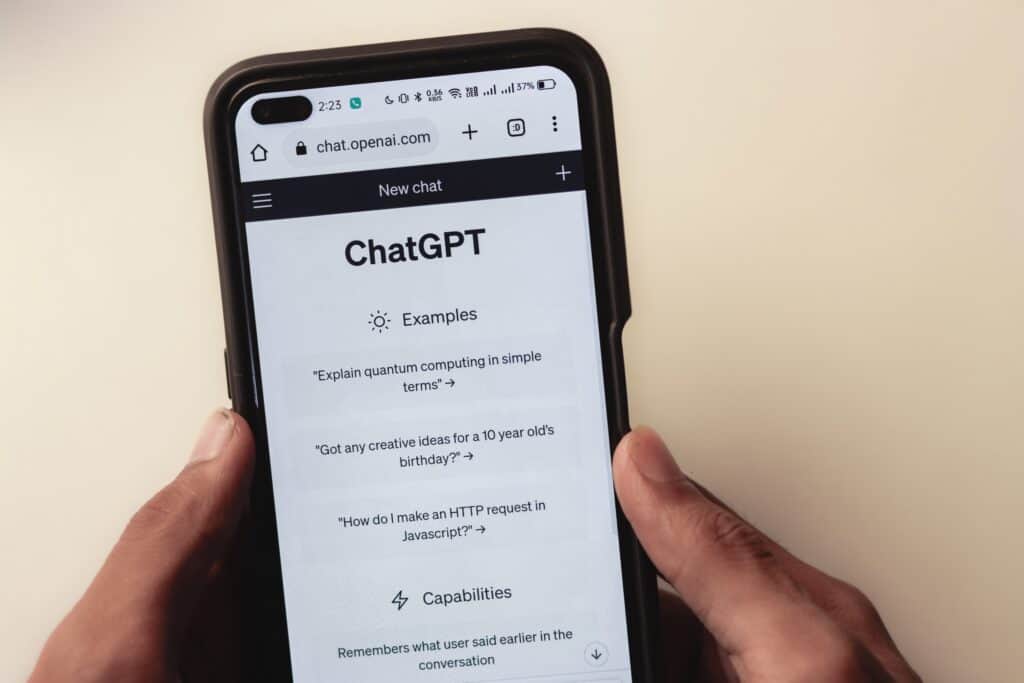
ChatGPT has taken the world by storm since it was launched last November. The hype around the artificial intelligence tool generated a record number of one million users in only 5 days. The technology behind ChatGPT showcases the potential for various use cases across industries and jobs. Tools like ChatGPT will impact the future of product development and startups.
Founders must understand ChatGPT and similar technologies to determine how best to leverage its capabilities. Making sense of how to use this text-generating bot and others like it will almost certainly be necessary for startups. We’ll be diving deeper into ChatGPT, its current uses, how it is disrupting the current tech landscape and other topics that are relevant to founders.
What is ChatGPT?
Powered by AI technology, ChatGPT is a natural language processing (NLP) tool that’s capable of having human-like conversations. Its capabilities go well beyond the average chatbot. Developed by Open AI, ChatGPT was fine-tuned for human interaction that was designed primarily for customer service.
However, the tool is being used for a variety of other purposes including generating code and writing essays. The use of ChatGPT is currently free of charge and open to the public as Open AI enters its research and feedback-college phase. Recently, Open AI has launched a paid subscription version of the tool that’s called ChatGPT Plus.
ChatGPT answers questions and queries that users make by gathering data from the internet and using computing predictions. The replies generated by ChatGPT are prompted by textual information and requests. The chatbot “learns” about different subjects and how to talk about them through these interactions.
History of ChatGPT and Predecessors
Artificial Intelligence research started making waves in the mid-nineties. Richard Wallace of Massachusetts Institution of Technology (MIT) created the first AI chatbot. Given the name A.L.I.C.E (Artificial Linguistic Internet Computer Entity), it used a natural language processing system to enable it to naturally converse with humans.
Shortly after the debut of A.L.I.C.E., IMB created its own AI chatbot called Watson. Using a mix of AI algorithms and natural processing, Watson could understand complex questions and provide answers in human-like style. This led to the development of AI chatbots that used natural language processing.
Microsoft’s Cortana and Google’s Allo were launched in 2016. Both tools had AI-powered chatbot capabilities. The year after, Facebook and Apply joined the mix with M and Siri. The first commercially available AI-based chatbot platform called Chatfuel also launched that year.
Open AI launched its Generative Pre-trained Transformer (GPT) model in 2018, which subsequently lead to the development of ChatGPT. The GPT model could generate human-like responses to questions and used a conversational tone. Its development was the immediate predecessor to ChatGPT which combined natural language processing and GPT technology.
By combining AI-powered natural language processing and GPT technology, ChatGPT was capable of providing more accurate and human-like answers than other chatbot platforms. The tool is also able to understand more complex conversations and is capable of learning. These capabilities made it a powerful tool for businesses seeking to automate customer service functions.

How is ChatGPT being used?
OpenAI developed ChatGPT for the primary purpose of using it as a customer service automation tool. Data from books, Wikipedia, and the Internet has been imputed into ChatGPT to enable it to comprehend and conversate with people about a variety of topics. The use cases for ChatGPT go well beyond customer service functions. Here are several examples of how founders and their startups could use this AI tool below.
Business Planning
Business planning and brainstorming new ideas is a time-consuming and exhaustive process. ChatGPT can save your startup a lot of time during this stage by helping you through the business planning process. A few ways to use ChatGPT in this capacity are:
Market Research
You can ask ChatGPT to help you identify ideal customer profiles. Startups, particularly in their early stages will fall victim to their own bias when coming up with the right customer segments. To use ChatGPT in this manner, you can describe your SaaS product and list its key features. ChatGPT will spit out a response of potential customer profiles to consider.
Of course, having human-human interaction is ideal for getting the most accurate results. But ChatGPT could save founders countless hours and provide a good starting point to begin their research. An additional market research use case for ChatGPT is getting feedback on previous ventures to help identify areas of improvement. This can help founders get a better understanding of the needs that exist for the market.
Monetization Strategy and Pricing Model
Early-stage startups have a particularly hard time monetizing their product successfully. The pricing models vary by industry, product, etc. Subscription-based pricing is a model where customers pay a recurring fee to access the product. It’s a popular pricing model because it’s the simplest.
However, there are many challenges to using a subscription-based pricing model. For example, account sharing is not always a viable option whereas your customers may want it. ChatGPT can help you come up with a monetization strategy for your product. Like in other scenarios described here, you would describe your product, its features, use cases, and the challenges you’re having with monetizing it. You’ll want to test and get actual feedback from users after trying some of the ChatGPT’s recommendations.
Performance Metrics Tracking
You can also use ChatGPT to provide you with real-time insight and recommendations. These metrics can help improve the operations of your business and help achieve its goals.
Forecasting
Using its data analysis and machine learning algorithms, ChatGPT can provide accurate sales and revenue forecasts. You can use this information to help make data-driven decisions on future investments, resource allocation, and budgeting.
Product Development
The product development stage is another area in that ChatGPT can assist startups. A few potential uses are below:
Identifying Product Features
Startups spend a ton of time and resources to build features that they hope will bring in new customers or increase usage. Oftentimes, these new features end up not being used by customers. ChatGPT won’t be able to predict what features will be in high demand, but it can speed up the process.
You can do these by describing your product, the current feature set, the customer profile, and use case to ChatGPT. Then you can ask it what features to build to get the user to become more productive, get more value, etc. out of it.
Data Analysis
To gain insight into consumer preferences, behaviors, and more, you can use ChatGPT for data analysis and machine learning. This type of information is important when it comes to future product development decisions.
Testing and Prototyping
ChatGPT can be used to conduct user testing by providing prototypes of new products. It will help gather feedback from users. Using this information, you can improve the product and make changes according to customers’ wants and needs.

Content Creation
Aside from automating customer service, another reason for ChatGPT’s fast rise in popularity was its ability to write text. The tool can write on almost any topic for a requested length. As such, you can use ChatGPT to help write content for newsletters, social media posts, and even full articles.
The downside is that ChatGPT uses content that already exists to do this. Therefore, it’s possible that in the future Google can detect contend written by AI. Since SEO promotes unique content first, using ChatGPT to write your content is not ideal.
Alternatively, ChatGPT can be used to help you generate ideas and conduct research that you can use to write your own content.
Sales Process
Businesses are always looking for ways to improve their sales processes and increase sales productivity. Here are a few examples of ways you can use ChatGPT for improving your sales processes:
Customer Service
The most straightforward use case for ChatGPT is using it to automate customer service. The AI tool can be used as a chatbot to support customers 24/7 by answering questions, providing product information, and resolving issues. Using ChatGPT in this manner can reduce the workload of customer service agents and also help improve overall customer satisfaction.
Sales and Marketing Emails
Crafting an email outreach campaign is critical, particularly for B2B startups. Finding the right cadence can take time and be tricky. Founders can simplify this process by using ChatGPT to craft custom email sequences for their customer segments. These messages can be plugged into automated email software seamlessly.
One note on using ChatGPT for crafting these emails is that it does take some time to figure out the right prompt. For example, to prevent the messages from sounding too unnatural, you’ll want to tell ChatGPT to use a certain tone.
E-Commerce
If your business takes online orders, ChatGPT can be used to organize and process them, faster and more efficiently. Save time and resources by using ChatGPT to take orders, process payments, and track shipments.
How can ChatGPT disrupt the current tech landscape?
As technology evolves and improves, more people will use artificial intelligence tools like ChatGPT to perform their daily tasks. The uses span from smaller use cases such as conversations with friends to handling complex tasks such as managing multiple tasks simultaneously.
The customer service industry is posed to be revolutionized by technologies like ChatGPT. Startups and businesses can use AI bots that use ChatGPT to assist customers. This allows for faster and more accurate responses where the bot can use previous interactions with customers to improve.
Data entry, online ordering, and other tasks can be automated by ChatGPT to help businesses save time and money while increasing efficiencies. We’re already seeing various startups harnessing ChatGPT to create new products with new use cases. As these applications increase and improve, we will see them being used in other industries like finance, education, and healthcare.
Considerations for using ChatGPT.
The excitement and energy for ChatGPT is high at the moment. With the various ways to use the tool and its potential to impact various industries, there’s certainly a lot to look forward to in the future. There are implications of this technology that we must also consider and determine the right way to approach them.
Limitations
ChatGPT is a powerful AI tool that has the capability to improve customer experience and the efficiency of businesses. It has shortcomings as well. For example, ChatGPT runs the risk of producing inaccurate or biased content occasionally.
The software is constantly being updated with new information and features to make it reliable and trustworthy. But it is still a software tool that can’t think for itself. ChatGPT also can’t predict the future or how a person may respond in a situation. Therefore, its responses might not always make sense or can feel robotic.
Concerns
Some people are concerned that ChatGPT may replace humans in the future. This would lead to fewer jobs. ChatGPT and other AI-based technology will likely be used to automate many tasks. However, it’s not likely that it will take away jobs. Even as the technology evolves, it will never have a real human touch. Critical thinking, decision-making, and creativity are skills that it won’t be able to replicate.

How can Founders Position themselves to react well?
For founders in this new age of AI technology, the best way to react to ChatGPT is to understand it and how it applies to their startup. This technology is far from a novelty that will go away in a few years. ChatGPT can automate tasks, create efficiencies, and improve customer satisfaction while saving money and time. Steering away from this technology could mean losing out on possibilities.
Think of other cases in the evolving landscape of technology. When broadband emerged in the early 2000s, that lead to rise of cloud computing which led to brand new giant companies. Smartphones and social media in the 2010s enabled people to have the ability to become influencers and lead to a multitude of app-based startups.
Founders should take this opportunity to embrace ChatGPT and other AI technologies. Leveraging these tools appropriately could lead to gaining competitive advantages that help the success of a startup.
How will ChatGPT evolve?
It is clear that AI has great potential for the future. ChatGPT and other technologies like it can offer the startup founder a place to generate new ideas, streamline operations, or identify new revenue streams.
OpenAI recently launched its newest version of ChatGPT that’s powered by GPT-4. With this release comes numerous improvements and new features. This version gives the chatbot the ability to handle longer reams of text and understand complex ideas betters.
The technology is at its early stages where founders can reap the benefits as long as they can navigate through the tornado caused by the new technology adoption. The pace of innovation will continue to accelerate and those who position themselves to capitalize on the technology will be the winners.



